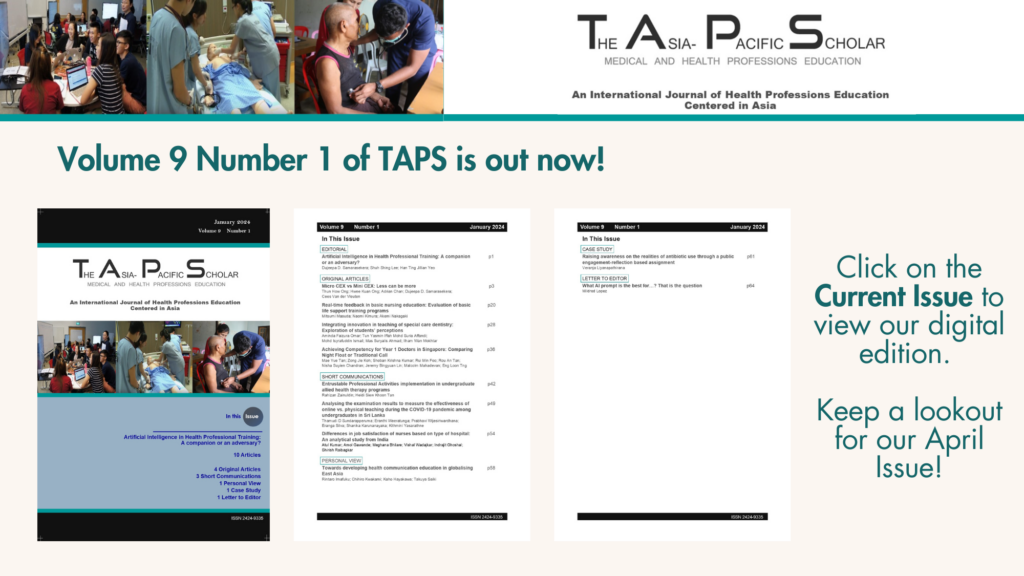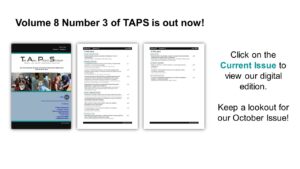Brief overview of Pengiran Anak Puteri Rashidah Sa’adatul Bolkiah Institute of Health Sciences, Universiti Brunei Darussalam
Submitted: 25 April 2024
Accepted: 21 August 2024
Published online: 1 October, TAPS 2024, SP01, 11-13
https://doi.org/10.29060/TAPS.2024-SP01/SP004
Kenneth Yuh Yen Kok
Pengiran Anak Puteri Rashidah Sa’adatul Bolkiah Intsitute of Health Sciences, Universiti Brunei Darussalam, Brunei
I. INTRODUCTION
Formerly known as Institute of Medicine which was inaugurated in September 2000, the institute was renamed Pengiran Anak Puteri Rashidah Sa’adatul Bolkiah (PAPRSB) Institute of Health Sciences in July 2009, after the integration of Pengiran Anak Puteri Rashidah Sa’adatul Bolkiah College of Nursing with the Institute of Medicine. The institute was established in line with the vision of the Government of Brunei Darussalam to provide medical training not only to Brunei students but also to students from other parts of this region, as expressed by His Majesty the Sultan in his speech during the 12th Universiti Brunei Darussalam (UBD) Convocation (Ramassamy, 2006).
The Institute started its first programmes in collaboration with established international universities. The Biomedical Science undergraduate programme was set up in 2001 in collaboration with University of Queensland, Australia which ran on until 2005. The Medicine programme was introduced in 2004 when the Institute offered students with articulation medical degrees with partner medical schools in Australia, Canada and the United Kingdom.
The programmes offered are products of a continuous review of the curricula. All the undergraduate and postgraduate programmes as well as diplomas have undergone regular enhancements and are now designed to encourage innovation and entrepreneurship, and for students to assume leadership roles, tempered with a keen awareness of the environment. UBD ensures that the Institute remains relevant and sensitive to the rapidly changing needs of the country and work closely with the Ministry of Health, Brunei Darussalam (Ministry of Health, 2000).
PAPRSB Institute of Health Sciences has been actively and continuously developing and upgrading all aspects of its resources. The facilities at the institute include Problem-Based Learning base rooms, seminar rooms, lecture theatres, research labs, clinical and communication skills suites, and an Anatomy Resource Centre. In June 2014 a new purpose built facilities containing state-of-the-art resources building was opened. The new extension building is equipped with a medical clinic, simulation centre, more research laboratories facilities as well as teaching facilities. The simulation centre includes 5 simulation rooms with dedicated Emergency Bay, Medical Surgical Bay, and Operating Theatre Bay. There are 2 separate simulation rooms i.e. Maternity Bay, and Children Bay equipped with audio visual control system. In addition, there is an 8 bedded simulation ward. These facilities are being used for inter-professional education and they provide a focus for multidisciplinary clinical scenarios.
As the institute continues to expand and develop, every effort is being made to ensure that the it is aligned with the broader vision of UBD, which is to become a highly reputable University at the international level and to support the development needs of the various stakeholders, both nationally and regionally.
UBD prides itself as a socially responsible university. Thus, the Bachelor of Health Science (Medicine) programme was designed with the needs of the country in mind whilst at the same time ensuring that the graduates of the programme are well trained and able to compete in the international arena. The involvement of various participating partner medical schools in several different countries ensures that future Brunei doctors graduate from a diverse training background. Enrolment of international students into this programme also provides cultural enrichment exercise whereby these students learn more about Brunei Darussalam, its people, our national philosophy of Malay Muslim Monarchy and its healthcare system.
The Medicine programme was developed by building on programmes that have already been organised by the PAPRSB Institute of Health Sciences and by working with established partner medical schools from various countries worldwide. The programme is conducted in 2 phases. The first phase consists of 3 years at UBD after which students are transferred to one of the Partner Medical Schools (PMS) for the second phase of the programme. Having successfully completed the first phase of the programme at UBD, the students are awarded the Bachelor of Health Science (Medicine) degree. The award of this degree is a requirement for students to progress to the PMS to complete the final phase of the undergraduate medical programme, after which successful students graduate with degrees from the partner universities. In summary, a student who has completed the whole programme successfully would be awarded a double degree i.e. BHSc (UBD) and Medicine (PMS). Such an innovative move is part of institute’s plan to produce “clinician scientists” (and not just pure clinicians) for the future (UBD PAPRSB Institute of Health Sciences, 2024).
II. THE FOUNDING MEMBER OF ASEAN MEDICAL SCHOOL NETWORK
PAPRSB Institute of Health Sciences’ journey in ASEAN Medical School Network (AMSN) began with visionary institutions that laid the foundation for the AMSN. Along with the 11 esteemed institutions from Cambodia, Indonesia, Lao PDR, Malaysia, Myanmar, Philippines, Singapore, Thailand and Vietnam, PAPRSB Institute of Health Sciences became one of the Founding Members of AMSN. The network welcomed 8 new member institutions from Indonesia, Malaysia, Myanmar, Vietnam, Thailand and Singapore, with the current membership of 20 institutions from 10 ASEAN member states.
III. ASEAN MEDICAL DEAN’S SUMMIT
AMSN’s key initiative is the annual ASEAN Medical Deans’ Summit (AMDS). The AMDS seeks to cultivate collaboration among esteemed medical institutions in the ASEAN region, with a focus on advancing global standards in medical education and healthcare systems. Its primary goal is to lay the groundwork for unified action. The inaugural Summit took place in 2012 at Siriraj Hospital, Mahidol University in Bangkok, Thailand. It is customary for member institutions to host the Summit on a rotational basis. The 2nd Summit was held in Malaysia in 2013, the 3rd Summit in Singapore in 2014, the 4th Summit in the Philippines in 2015, the 5th Summit in Indonesia in 2016, the 6th Summit in Myanmar in 2017, the 7th Summit in Vietnam in 2018, and Brunei Darussalam proudly hosted the 8th Summit in 2019. In 2020, the 9th Summit was hosted virtually by Thailand adapting to the global travel restrictions imposed due to the COVID-19 pandemic, physical attendance was resumed in the 10th Summit in Cambodia in 2021, the 11th Summit was held in Lao PDR, the 12th Summit in Malaysia, and most recently 13th Summit in Thailand.
IV. 8TH ASEAN MEDICAL DEANS’ SUMMIT MEETING IN PAPRSB INSTITUTE OF HEALTH SCIENCES, UBD
From 23rd to 24th August 2019, PAPRSB Institute of Health Sciences, UBD hosted the 8th ASEAN Medical Deans’ Summit meeting and it was attended by the executive members of 12-member institutes of AMSN. The 4th ASEAN Students’ Collaborative Project (ASCP) was also held in conjunction with the 8th AMDS.
The theme of the 8th AMDS meeting was “Inter-Professional Education and Mental Health Issues”, and it provided a platform for the sharing of views, practices and advances in inter-professional education and mental health issues within the ASEAN region. The meeting also covered the discussions on the quality of medical education across ASEAN countries, professional training following graduation and the promotion of research culture and international collaboration amongst AMDS members.
The 4th ASCP showcased and highlighted the community projects conducted by medical, dental, and health sciences students from AMDS member institutes. This platform enabled the students to share their research interests, to experience knowledge enrichment in ASEAN medical education, and to exchange the culture among the students from various countries.
V. GLOBAL CLASSROOM INITIATIVES AND AMSN WEBINAR SERIES
Faculty members and students from PAPRSB Institute of Health Sciences regularly attend the Global Classroom Initiatives and AMSN Webinar Series. The Global Classroom Initiative, hosted by the Faculty of Medicine Siriraj Hospital, Mahidol University, Thailand provides a platform for esteemed speakers from AMSN to share their expertise through lectures on various topics.
The AMSN Webinar Series, which is hosted by National University of Singapore is a dynamic platform dedicated to facilitating collaboration within the AMSN community, sharing cutting-edge knowledge, and exchange of ideas and expertise from experts in the field. These engaging and informative webinars exemplify AMSN’s commitment to advancing medical knowledge and fostering collaboration within the ASEAN region.
Notes on Contributors
Kenneth Yuh Yen Kok MS wrote, reviewed and approved the manuscript.
Funding
There are no funding sources to disclose.
Declaration of Interest
The author declares no conflict of interests.
References
Ministry of Health. (2000). National Health Care Plan. Ministry of Health, Brunei Darussalam. https://www.moh.gov.bn/SitePages/original/National%20Health%20Care%20Plan.aspx
Ramassamy, R. (2006). Promoting health sciences in Brunei Darussalam. Brunei Darussalam Journal of Health, 1, 4-10. https://ihs.ubd.edu.bn/wp-content/uploads/2017/06/2006-v1-01-p04-10.pdf
*Kenneth Yuh Yen Kok
Jalan Tungku Link, BE1410,
Brunei Darussalam
Email: kenneth.kok@ubd.edu.bn
Announcements
- Best Reviewer Awards 2024
TAPS would like to express gratitude and thanks to an extraordinary group of reviewers who are awarded the Best Reviewer Awards for 2024.
Refer here for the list of recipients. - Most Accessed Article 2024
The Most Accessed Article of 2024 goes to Persons with Disabilities (PWD) as patient educators: Effects on medical student attitudes.
Congratulations, Dr Vivien Lee and co-authors! - Best Article Award 2024
The Best Article Award of 2024 goes to Achieving Competency for Year 1 Doctors in Singapore: Comparing Night Float or Traditional Call.
Congratulations, Dr Tan Mae Yue and co-authors! - Fourth Thematic Issue: Call for Submissions
The Asia Pacific Scholar is now calling for submissions for its Fourth Thematic Publication on “Developing a Holistic Healthcare Practitioner for a Sustainable Future”!
The Guest Editors for this Thematic Issue are A/Prof Marcus Henning and Adj A/Prof Mabel Yap. For more information on paper submissions, check out here! - Best Reviewer Awards 2023
TAPS would like to express gratitude and thanks to an extraordinary group of reviewers who are awarded the Best Reviewer Awards for 2023.
Refer here for the list of recipients. - Most Accessed Article 2023
The Most Accessed Article of 2023 goes to Small, sustainable, steps to success as a scholar in Health Professions Education – Micro (macro and meta) matters.
Congratulations, A/Prof Goh Poh-Sun & Dr Elisabeth Schlegel! - Best Article Award 2023
The Best Article Award of 2023 goes to Increasing the value of Community-Based Education through Interprofessional Education.
Congratulations, Dr Tri Nur Kristina and co-authors! - Volume 9 Number 1 of TAPS is out now! Click on the Current Issue to view our digital edition.

- Best Reviewer Awards 2022
TAPS would like to express gratitude and thanks to an extraordinary group of reviewers who are awarded the Best Reviewer Awards for 2022.
Refer here for the list of recipients. - Most Accessed Article 2022
The Most Accessed Article of 2022 goes to An urgent need to teach complexity science to health science students.
Congratulations, Dr Bhuvan KC and Dr Ravi Shankar. - Best Article Award 2022
The Best Article Award of 2022 goes to From clinician to educator: A scoping review of professional identity and the influence of impostor phenomenon.
Congratulations, Ms Freeman and co-authors. - Volume 8 Number 3 of TAPS is out now! Click on the Current Issue to view our digital edition.

- Best Reviewer Awards 2021
TAPS would like to express gratitude and thanks to an extraordinary group of reviewers who are awarded the Best Reviewer Awards for 2021.
Refer here for the list of recipients. - Most Accessed Article 2021
The Most Accessed Article of 2021 goes to Professional identity formation-oriented mentoring technique as a method to improve self-regulated learning: A mixed-method study.
Congratulations, Assoc/Prof Matsuyama and co-authors. - Best Reviewer Awards 2020
TAPS would like to express gratitude and thanks to an extraordinary group of reviewers who are awarded the Best Reviewer Awards for 2020.
Refer here for the list of recipients. - Most Accessed Article 2020
The Most Accessed Article of 2020 goes to Inter-related issues that impact motivation in biomedical sciences graduate education. Congratulations, Dr Chen Zhi Xiong and co-authors.









